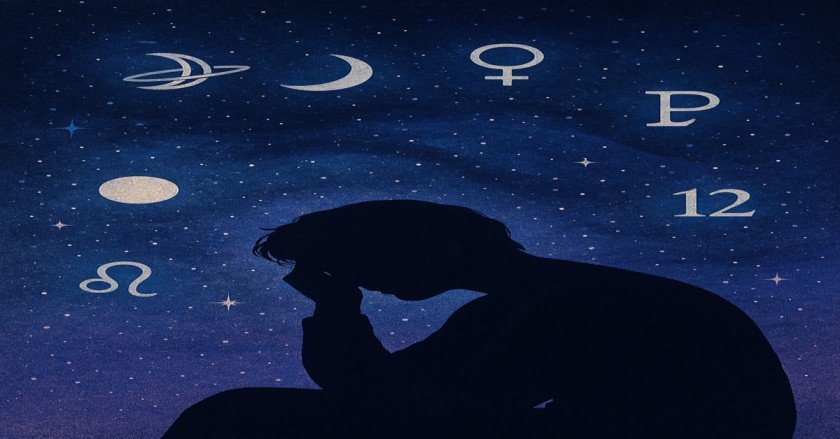


In recent years, astrology has become more than just a mystical guide to love and fortune—it has evolved into a self-awareness tool that many turn to in times of emotional struggle. But can astrology really help explain something as deep and personal as depression?
This article explores how specific placements in your natal chart can point to emotional vulnerabilities, internal patterns, and even the potential for depressive tendencies. While astrology is not a substitute for clinical help, it can be a powerful companion for understanding yourself better.
Depression is a complex mental health condition influenced by genetics, environment, and emotional trauma. But in astrology, our emotional wiring—how we process feelings, challenges, and isolation—can be mapped out in the birth chart. Certain planets and houses in astrology can reflect the inner battles we may face.
Instead of diagnosing, astrology provides insight into emotional tendencies, coping mechanisms, and the spiritual meaning of pain—helping people find clarity during dark times.
The Moon governs your emotions, instincts, and inner world. A challenged Moon in the birth chart can signal emotional turbulence.
Moon in Scorpio: Intense emotional depth, prone to secrecy and emotional overwhelm.
Moon in Capricorn: Emotional suppression, self-judgment, tendency toward pessimism.
Moon in the 12th or 8th House: Hidden emotional pain, often unprocessed trauma from early life.
If your Moon forms difficult aspects (like squares or oppositions) to Saturn, Pluto, or Neptune, you may be more susceptible to emotional heaviness or isolation.
🌙 Think of the Moon as your emotional thermostat. If it’s poorly placed or afflicted, your inner world might feel colder or stormier than others’.
Saturn is often referred to as the “taskmaster” of the zodiac. It represents restrictions, discipline, and lessons.
Saturn in the 1st or 12th House: A strong sense of personal inadequacy or fear of expression.
Saturn-Moon aspects: Emotional restriction, cold upbringing, or emotional neglect.
Saturn Return (ages 27–30, 56–60): A major period of life transition and self-confrontation, often triggering depression or identity crises.
While Saturn’s energy can be heavy, it also fosters resilience. Those who face Saturnian challenges are often the most disciplined, wise, and empathetic after transformation.
The 12th house rules isolation, secrets, subconscious patterns, and spirituality. It’s often linked with hidden pain, karmic issues, and unresolved grief.
Planets in the 12th house often act in the background, influencing emotions subtly but powerfully.
People with Moon, Mercury, or Venus in the 12th may struggle to express feelings or suffer in silence.
This placement is common among empaths, introverts, and highly sensitive individuals.
Pluto represents deep transformation, death, rebirth, and hidden psychological wounds. When prominent in a chart:
Pluto in aspect to personal planets (Moon, Sun, Venus) can indicate intense emotional or psychological experiences.
Individuals may undergo profound inner crises but are also gifted with the ability to rise like a phoenix from their own ashes.
In spiritual astrology, some episodes of depression are interpreted not as pathology but as a “dark night of the soul.” This is a period where the soul undergoes deep transformation and ego death—often catalyzed by transits from Pluto, Neptune, or Saturn.
These experiences may feel unbearable, but they often lead to awakening, healing, and a rebirth of purpose. Knowing where these planets are transiting your chart can offer guidance through these difficult times.
Certain planetary transits can coincide with mental and emotional struggles:
Saturn transiting the Moon or Sun: Feelings of loneliness, pressure, and self-doubt.
Pluto square/opposite Sun or Moon: Emotional breakdowns or ego transformations.
Neptune square Mercury or Moon: Confusion, lack of mental clarity, emotional fog.
Being aware of these cycles can help you prepare, find compassion for yourself, and seek the right support.
While astrology can highlight challenges, it also offers solutions and empowerment:
Wearing gemstones aligned with your lagna (ascendant) or Moon sign
Performing mantras or rituals for specific planets (e.g., Saturn mantra for emotional strength)
Tracking lunar phases to align self-care practices
Using Full Moons for emotional release and New Moons for setting intentions
Working with an astrologer who focuses on psychological astrology or astro-therapy
Integrating shadow work and inner child healing based on your chart
It’s important to note that astrology does not cause depression. It simply reflects potential areas of emotional difficulty. Just because you have Saturn in the 12th or Moon square Pluto doesn’t mean you’re doomed to struggle—but it does mean you may carry emotional intensity that needs nurturing.
Astrology should never replace therapy or medical advice. Instead, it acts as a sacred mirror—helping you understand why certain themes repeat, where healing is needed, and what your soul might be trying to learn.
Case 1: A woman struggling with postpartum depression had Moon in the 12th house square Pluto—revealing suppressed maternal emotions and transformation through motherhood.
Case 2: A man with lifelong anxiety had Mercury square Neptune, indicating mental fog and unclear thinking—further confirmed during Neptune’s return transit.
By seeing their patterns mirrored in the sky, both found new compassion for themselves—and paths forward in healing.
Astrology doesn’t promise to cure depression, but it offers language, context, and cosmic compassion. For many, knowing there’s a deeper purpose to pain can be the beginning of hope.
Whether you’re dealing with loss, burnout, or existential dread—your birth chart holds clues to what your soul came here to learn and transcend.
So if you’re walking through a dark period, remember:
“The stars may not erase your shadows—but they can illuminate your path through them.”